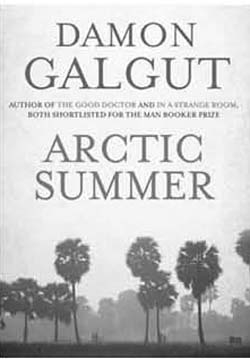Astory about the secret life of a novelist and short-story writer, and a famous one at that, never fails to interest, and this novel does not disappoint. Mainly covering the twelve-year period between 1912 and 1924 when the conception and writing of the classic novel, A Passage to India, took place, Damon Galgut takes us through the repressed life of E.M. Forster, a creature of Empire who was also the victim of its restrictive class, racial and morality norms. Forster’s homosexuality was known among his inner circle but never to his wider audience of readers until his posthumous novel Maurice was released. Therefore, all his sexual activity (or most often, inactivity) had to be kept under wraps. During this period, there were three men in his life: Hugh Owen Meredith (Hom) in England, Masood in India, and Mohammed in Egypt. Hom is a fellow Kings’ man from Cambridge who engages in minor sexual activity with Forster (kissing, cuddling and rolling on the carpet) before moving onto the respectability of marriage, family and social standing, leaving his ‘dark chapter’ behind. Masood is a brash intellectual whom Forster tutored in England and meets again in India, a lover who becomes a lawyer and who also pursues marriage to further his career. Mohammed is a poor tram conductor in Alexandria and, by far, the only one to truly reciprocate Forster’s feelings (though not always his actions), but he too must inevitably succumb to marriage, leaving Forster forlorn.
Forster, in 1912, was coming off the success of his acclaimed fourth novel Howard’s End, a book that laid bare the ills of the sterile British class system and signalled the setting of the sun on the Empire, despite Winston Churchill’s claim to the contrary. Howard’s End had been praised by critics but disliked by his domineering mother, Lily, for exposing the vanity of the British middle class; the novel gave Forster the opportunity to quit his day job and take up the life of a full-time writer and make the journey to India, a pilgrimage that every honest British Empire-man was expected to make during his lifetime. He reconnects with Masood in India, but sees the man slipping away from him. Forster is tortured by the heat, and the lust that it ignites in him, a lust that has no outlet except in his imagination. His excursion to the Barabar Caves gives him the impetus for the novel A Passage to India, but he abandons writing it for he does not know how to conclude the outcome of the cave scene—he is missing the ‘big event’. During this visit, he experiences the two solitudes of culture that exist between the British in India and the locals: reserve vs. demonstrativeness, brevity vs. expansionism, punctuality vs. tardiness, logic vs. superstition, thinking vs. feeling, class vs. caste. The first Indian segment in the novel reads like a travelogue with huge chunks of narrative and with pauses only for Forster to observe the stark differences between this exotic land and his native England. There is no love lost between the rulers and the ruled, and his fellow countrymen in India do not see the value of books, for they place more importance on guns and sports. Forster returns from India, confused and inconclusive in his love life and in his writing.
India however gives him the impetus to write Maurice, a no-holds barred exposé on the lives of ‘solitaries’ and ‘minorities’ and their supposedly deviant sexuality that was still deemed illegal—Oscar Wilde had been sent to prison for his flagrancy within living memory. Maurice would remain a secret and unpublished until Forster passed away. WWII intervenes, Forster enlists to do his bit and is sent to Egypt. In Alexandria, the celebrated author, who had so far only had sex in his imagination, is crudely introduced to the physical act by an injured soldier, at the ripe old age of 37.

